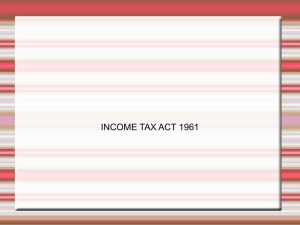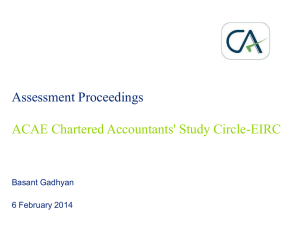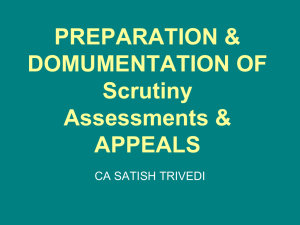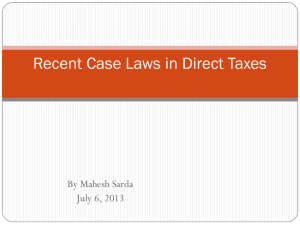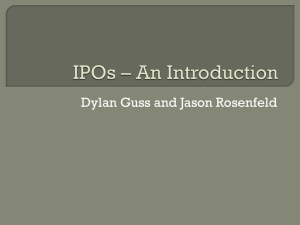SEMINAR DATED 17TH JUNE 2012
advertisement
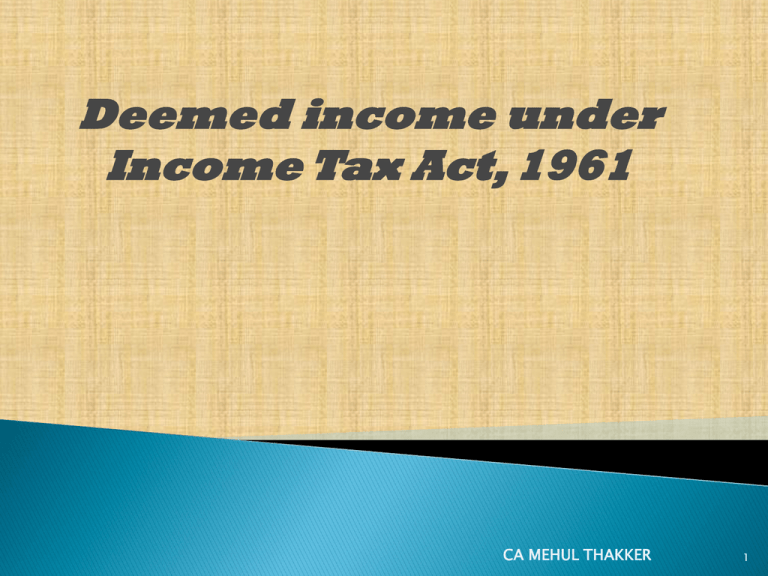
Deemed income under Income Tax Act, 1961 CA MEHUL THAKKER 1 Let’s consider the provisions of section 41 (1) Section 41(1) is applicable if the following conditions are satisfied— Condition one - In any of the earlier years a deduction was allowed to the taxpayer in respect of loss, expenditure or trading liability incurred by the assessee. CA MEHUL THAKKER 2 Condition two - During the current previous year, the taxpayer— a. has obtained a refund of such trading liability (it may be in cash or any other manner); Or b. has obtained some benefit in respect of such trading liability by way of remission or cessation thereof (“remission or cessation” for this purpose includes unilateral act of the assessee by way of writing off of such liability in his books of account). CA MEHUL THAKKER 3 If the above two conditions are satisfied, the amount obtained by such person (or the value of benefit accruing to him) shall be deemed to be profits and gains of business or profession and accordingly chargeable to tax as the income of that previous year. CA MEHUL THAKKER 4 Considering the above, Hon’ble Supreme Court in case of Polyfex India (P.) Ltd. v. CIT [2002] 124 Taxman 373 held that where expenditure is actually incurred by reason of payment of duty on goods and the deduction or allowance has been given in the assessment for earlier period, the assessee is liable to disgorge that benefit as and when he obtains refund of the amount so paid. The consideration whether there is a possibility of the refund being set at naught on a future date will not be relevant CA MEHUL THAKKER 5 consideration. Once the assessee gets back the amount which was claimed and allowed as business expenditure during the earlier year, the deeming provision in section 41(1) comes into play and it is not necessary that the Revenue should await the verdict of higher court or the Tribunal. If the court or the Tribunal upholds the levy at a later date, the assessee will not be without remedy to get back the relief (the amount so paid will be allowed as deduction under section 43B on “payment” basis). CA MEHUL THAKKER 6 Section 41 (1) creates a liability to pay tax only in those cases where an allowance had been actually granted, and not where the income had been estimated. Once income has been estimated, the deduction cannot be said to have been actually allowed. –Tirunelveli Motor Bus Serive Co. (P) Ltd vs. CIT [1970] 78 ITR 55 (SC), CIT vs. Bhawan Va Path Nirman Bohra [2002] 258 ITR 440 (Raj). CA MEHUL THAKKER 7 As regards trading liabilities, section 41(1) can be applied only upon “remission or cessation”. When a liability becomes barred by the law of limitation, there is neither remission or cessation of the liability. In such cases the liability is not extinguished, only the creditor’s remedy becomes barred. Therefore, if the amount of a trading liability which has become barred by limitation cannot be taxed in the year in which it has become time-barred. - CIT vs. Sugauli Sugar Works (P) Ltd. [1999] 236 ITR 518 (SC) . CA MEHUL THAKKER 8 In the case of CIT v. T.V. Sundaram lyengar & Sons Ltd. [1996]88 Taxman 429, the Supreme Court has held that such amounts are to be treated as income of assesse. The amount representing unclaimed credit balances will be liable to be taxed during the assessment year relevant to the previous year in which such amount is written back to Profit and Loss account by the assesse. Further, in view of the amendment with effect from A.Y. 1997-98, unilateral act of writing off any liability is also covered by section 41(1). CA MEHUL THAKKER 9 This issue came up before the Delhi High Court in Rollatainers Ltd. v. CIT (2011) 339 ITR 54. Waiver of term loan (Principal) The High Court observed that, as regards term loans, the same were taken for the purchase of capital assets from time to time. Therefore, since the money did not come into the possession of the assessee on account of any trading transaction, the receipts were capital in nature, being loan repayable over a period of time along with interest. The liability in question, CA MEHUL THAKKER 10 i.e. the term loan for purchase of capital assets, is not a trading liability. Therefore, the provisions of section 41(1) are not attracted in this case since the waiver is in respect of a term loan taken for a capital asset and hence, cannot be treated as remission or cessation of a trading liability. Thus, the waiver of such term loans cannot be treated as income of the assessee. CA MEHUL THAKKER 11 Waiver of working capital loan (Principal) In a case where loan is written off in the cash credit account, the benefit is in the revenue field as the money had been borrowed for day-to-day affairs and not for the purchase of capital asset. These loans were for circulating capital and not fixed capital. They were received for carrying out the day-to-day operations of the assessee. CA MEHUL THAKKER 12 Therefore, the writing off of these loans on the cash credit account amounted to remission of a trading liability and hence, has to be treated as income in the hands of the assessee by virtue of section 41(1). As far as waiver of interest is concerned, the same cannot be brought to tax by invoking the provisions of section 41(1), whether it be interest on term loan or working capital loan, since such interest CA MEHUL THAKKER 13 would not have been allowed as deduction in any earlier previous year due to the provisions of section 43B requiring actual payment for claiming deduction of interest. Therefore, since no deduction would have been allowed in any earlier previous year on account of non-payment of such interest, there is no question of taxability of interest in the year of waiver. CA MEHUL THAKKER 14 Section 59 (1) provides that the provisions of subsection (1) of section 41 shall apply, so far as may be, in computing the income of an assessee under section 56, as they apply in computing the income of an assessee under the head "Profits and gains of business or profession". CA MEHUL THAKKER 15 Hon’ble Calcutta High Court while answering the above issue in case of CIT V. India Automobiles Ltd. 251 ITR 117 (2001) held that there is no deeming provisions under the head “Income from house property” like section 41(1) under the head “Profits and gains from business or profession” or section 59 under the head “Income from other sources”. And therefore, in the absence of such provision under the statute, refund of municipal tax can never be taxed. CA MEHUL THAKKER 16 (i) Recently, in Amiantit International Holding Ltd., [2010] 189 Taxman 149 (AAR-New Delhi), Dana Corporation, [2010] 186 Taxman 187 (AARNew Delhi) and Goodyear Tire & Rubber Co., [2011] 199Taxman 121 (AAR-New Delhi), it was held that where consideration for which capital asset has been transferred, is not ascertainable then gain cannot be measured (means calculation machinery fails), therefore gain arising from transfer of such asset shall not be taxed. CA MEHUL THAKKER 17 (ii) Consequently, a new section 50D has been inserted by the Finance Act, 2012 providing that, in case where the consideration received or accruing as a result of the transfer of a capital asset by an assessee is not ascertainable or cannot be determined, then, for the purpose of computing income chargeable to tax as capital gains, the fair market value of the said asset on the date of transfer shall be deemed to be the full value of consideration received or accruing as a result of such transfer. CA MEHUL THAKKER 18 (iii) Considering the above amended provision, contention of Mrs. A is not acceptable and Rs. 12,00,000 shall be deemed to be the sale consideration while computing capital gain in her hands. CA MEHUL THAKKER 19 The Amritsar Bench in the case of ACIT V. Citizen Urban Co-Operative Bank Ltd. [2009] 314 ITR 91 held that public deposits accepted by bank are not covered u/s 68 as the bank is not obliged to question the source of deposit of customers where depositors have been properly introduced. CA MEHUL THAKKER 20 The Madhya Pradesh High Court in the case of CIT v. Nevendram Ahuja [2007] 290 ITR 453 held that the landlord is only to prove the identity of the tenant and the genuineness of transaction under which deposit was made. There is no necessity to prove capacity of tenant to make deposit. Section 68 does not apply in such a case. CA MEHUL THAKKER 21 (i) Section 68 brings to tax any sum found credited in the books of an assessee, in respect of which the assessee does not offer any explanation about the nature and source of money so credited or the explanation offered by the assessee is not found to be satisfactory by the Assessing Officer. CA MEHUL THAKKER 22 (ii) A proviso has been inserted in section 68 by Finance Act, 2012 as under: any explanation offered by a closely held company in respect of any sum credited as share application money, share capital, share premium or such amount, by whatever name called, in the accounts of such company shall be deemed to be not satisfactory CA MEHUL THAKKER 23 - unless the person, being a resident, in whose name such credit is recorded in the books of such company also explains, to the satisfaction of the Assessing Officer, the source of sum so credited as share application money, share capital, etc. in his hands. - Otherwise, the explanation offered by the assessee-company shall be deemed as not satisfactory, consequent to which the sum shall be treated as income of the company. CA MEHUL THAKKER 24 However, this proviso shall not apply if the person in whose name such sum is recorded in the books of the closely held company is a VCF or a VCC registered with SEBI. Thus, amended proviso shall apply only when resident shareholder brings share capital, share premium…… and not when non-resident brings the money. Considering this, Rs. 1,00,000 (being amount received from Mr. Rajnikant) shall be taxed in the hands of company. (iii) CA MEHUL THAKKER 25 Company in which public are substantially interested: - Relevant clause of Section 2 (18) reads as under:- (b) if it is a company which is not a private company as defined in the Companies Act, 1956 (1 of 1956), and the conditions specified either in item (A) or in item (B) are fulfilled, namely :— CA MEHUL THAKKER 26 (A) shares in the company (not being shares entitled to a fixed rate of dividend whether with or without a further right to participate in profits) were, as on the last day of the relevant previous year, listed in a recognised stock exchange in India in accordance with the Securities Contracts (Regulation) Act, 1956 (42 of 1956), and any rules made thereunder ; Considering the above definition, ABC tutorials Ltd is the “company in which public are substantially interested” and therefore, proviso to section 68 shall not apply, hence, nothing shall be taxed in the hands of ABC tutorials Ltd. CA MEHUL THAKKER 27 Explanation 5A to Section 271 reads as under:In the course of search assesse is found to be the owner of a) Assets b) Income based on entry in Books of Accounts and documents and he claims that such assets or entry in books of accounts or documents represents his income for the “specified previous year”. CA MEHUL THAKKER 28 If above conditions are satisfied then Explanation 5A provides that taxpayer deemed to have concealed particulars of income and liable for penalty under section 271 (1) (c) even if such income is declared by a taxpayer in any return of income furnished on or after date of search. CA MEHUL THAKKER 29 a) b) c) Here specified previous year means previous year which has ended before date of search and due date for filling return of income for such year has expired and assesse has not submitted return. CA MEHUL THAKKER 30 Considering above explanation, previous year 2010-11 squarely falls under Explanation 5A. Hence, A.O. is justified for invoking penalty u/s. 271 (1) (c) on Rs. 6,00,000 even though same has been recorded in books of account before search. CA MEHUL THAKKER 31 Section 271AAB is applicable if search is initiated on or after July 1, 2012, there is some “undisclosed income” and it pertains to a “specified previous year”. In such a case, the assessee shall be liable for penalty under section 271AAB in addition to tax as follows:- 1. If undisclosed income is admitted during the course of search, the taxpayer will be liable for penalty at the rate of 10 per cent of undisclosed CA MEHUL THAKKER 32 income provided the following conditions are satisfied— a) The assessee in the course of the search, in a statement under section 132(4) admits the undisclosed income and specifies the manner in which such income has been derived; b) he substantiates the manner in which the undisclosed income was derived; c) he pays the tax, together with interest, if any, in respect of the undisclosed income; and CA MEHUL THAKKER 33 d) he furnishes the return of income for the specified previous year declaring such undisclosed income therein. 2. If undisclosed income is not admitted during the course of search but he satisfies conditions (c) and (d) (above), he will be liable for penalty at the rate of 20 per cent of undisclosed income. CA MEHUL THAKKER 34 3. In a case not covered under (1) and (2) above ,the taxpayer will be liable for penalty at the rate ranging from 30 percent to 90 percent of undisclosed income. Meaning of Specified previous year for the purpose of section 271AAB- “Specified previous year” means - CA MEHUL THAKKER 35 i. ii. the previous year in which search is conducted. the previous year a. which has ended before the date of search but b. the due date of furnishing return of income under section 139(1) has not expired before the date of search and c. the assessee has not furnished his return of income for the previous year. CA MEHUL THAKKER 36 Meaning of undisclosed income, for the purpose of this section, means: (1) any income of the specified previous year represented, either wholly or partly, by any money, bullion, jewellery or other valuable article or thing or any entry in the books of account or other documents or transactions found in the course of a search under section 132, which has CA MEHUL THAKKER 37 a) not been recorded on or before the date of search in the books of account or other documents maintained in the normal course relating to such previous year; or b) otherwise not been disclosed to the Chief Commissioner or Commissioner before the date of search; or CA MEHUL THAKKER 38 (2) any income of the specified previous year represented, either wholly or partly, by any entry in respect of an expense recorded in the books of account or other documents maintained in the normal course relating to the specified previous year which is found to be false and would not have been found to be so had the search not been conducted. CA MEHUL THAKKER 39 Considering above, previous year 2011-12 squarely falls under section 271 AAB. Hence, A.O. is not justified for invoking penalty u/s. 271 (1) (c). But A.O. may impose penalty under section 271 AAB on undisclosed income (i.e. Jewellery Rs. 5,00,000 ) ranging from 10% to 90% of such income. CA MEHUL THAKKER 40 Considering the definition of specified previous year and second limb of definition of “Undisclosed income”, A.O. may impose penalty under section 271 AAB on undisclosed income (i.e. unaccounted marriage expenditure Rs. 9,00,000 ) ranging from 10% to 90% of such income. CA MEHUL THAKKER 41 CA MEHUL THAKKER 42
